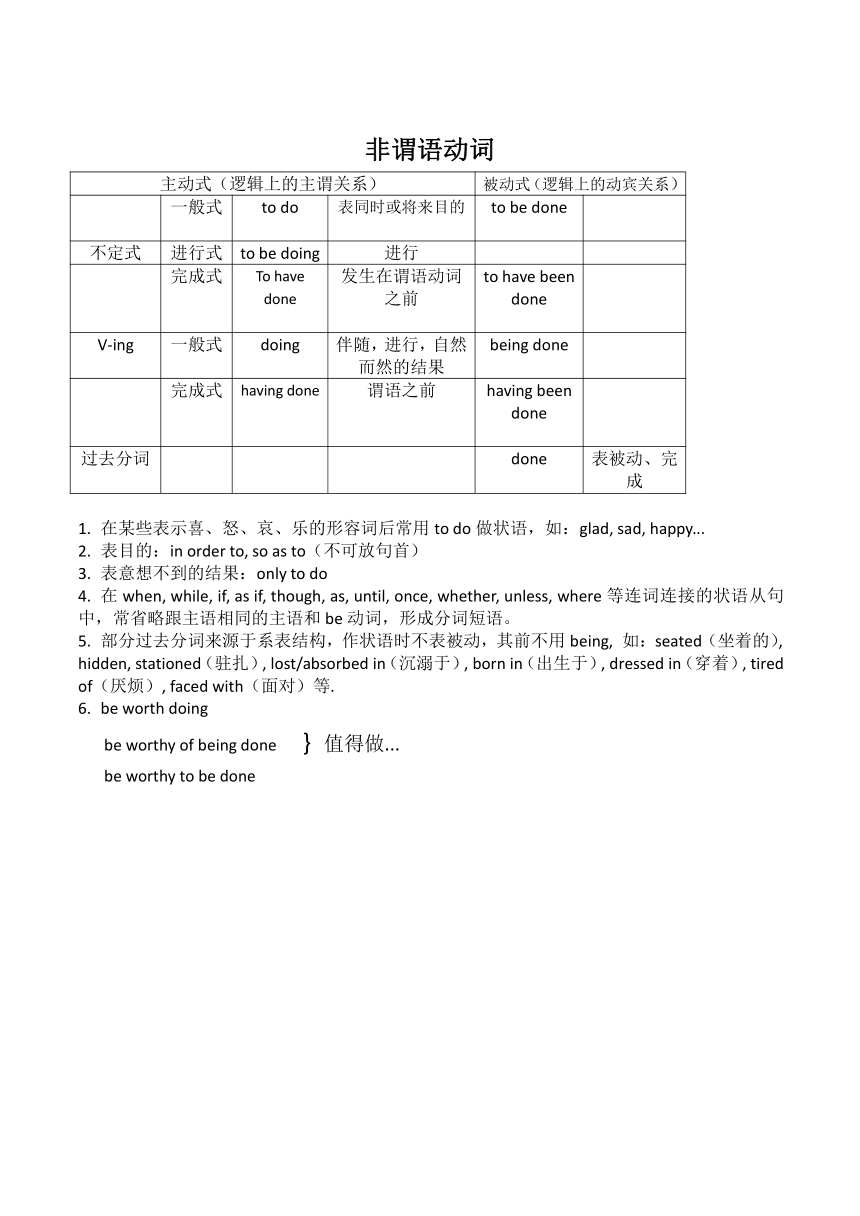
非谓语动词 主动式(逻辑上的主谓关系) 被动式(逻辑上的动宾关系) 一般式 to do 表同时或将来目的 to be done 不定式 进行式 to be doing 进行 完成式 To have done 发生在谓语动词之前 to have been done V-ing 一般式 doing 伴随,进行,自然而然的结果 being done 完成式 having done 谓语之前 having been done 过去分词 done 表被动、完成 在某些表示喜、怒、哀、乐的形容词后常用to do做状语,如:glad, sad, happy... 表目的:in order to, so as to(不可放句首) 表意想不到的结果:only to do 在when, while, if, as if, though, as, until, once, whether, unless, where等连词连接的状语从句中,常省略跟主语相同的主语和be动词,形成分词短语。 部分过去分词来源于系表结构,作状语时不表被动,其前不用being, 如:seated(坐着的), hidden, stationed(驻扎), lost/absorbed in(沉溺于), born in(出生于), dressed in(穿着), tired of(厌烦), faced with(面对)等. be worth doing be worthy of being done } 值得做... be worthy to be done 非谓语动词: +doing的动词 advise, admit, avoid, consider, delay, put off, enjoy, excuse, finish, deny, allow, escape, forgive, imagine, mind, keep, miss, practice, prevent, risk, suggest, appreciate, give up, can’t stand, be fond of, mention, permit, forbid +to do的动词 agree, decide, expect, help, hope, learn, manage, offer, pretend, promise, refuse, went, wish, afford, choose, demand, fail, attempt, plan, intend 宾语补足语是to do advise, allow, ask, cause, command, encourage, expect, forbid, force, get, hate, invite, leave, like, oblige, order, permit, persuade, prefer, request, tell, want, warn, wish, call on, depend upon, long for, wait for, require 宾语补足语是不带to的动词不定式 使役动词:make, have, let 感官动词:see, watch, notice, observe, look at, feel, hear, listen to +doing或to do意义不同 mean, remember, forget, try, stop, go on, regret, can’t help want, need, require(需要)+doing/ to be done + doing用主动表被动 动名词作介词的宾语,常用于固定短语和句型中.如: be/get used to, devote...to..., look forward to, pay attention to, get down to, think of, be proud of, prevent...(from)..., keep...from..., be engage in, feel like, be fond of, contribute to, stick to, have some difficulty/trouble/fun/pleasure/a good time/a hard time(in), there is no need/use/harm/good/hurry(in), when it comes to, succeed in, be committed to... +doing/to do 意思无差别,但若用于进行时,后面只跟不定式;如果表示一种 倾向,多接动名词作宾语,表示某一特定的或具体的行为,多接不定式. It was beginning to snow. I like listening to music, but today I don’t like to. 独立主格结构 名词/代词+现在分词/过去分词/不定式/名词/形容词/副词/介词短语. 可以作时间,原因,条件,方式,伴随状语等. The manager being ill, Bob is in charge of the company.(原因状语) Enough time given, we would have done the job much better.(条件状语) Nobody to come tomorrow, we will have to put off the meeting till next week.(条件状语) He sat there, his eyes on her back.(伴随状语) She stood in the front row, her mouth half locked.(方式状语) 分词作状语:悬垂分词的逻辑主语可与句子的主语不一致 Generally speaking(一 ... ...
~~ 您好,已阅读到文档的结尾了 ~~

